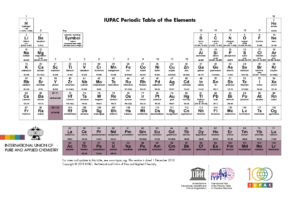The UN has proclaimed 2019 to be the International Year of the Periodic Table. So why has this honour been bestowed on something that most students will see on a daily basis in their science classrooms?
In 1869, a brilliant Russian scientist, by the name of Dimitri Mendeleev, made a breakthrough that has had a profound effect on science ever since. Mendeleev devised a system that brought order from chaos. For many years, scientists had attempted to make sense of the chemical world around them but without complete success. Mendeleev demonstrated that with sound scientific knowledge, trial and error and perseverance, “one of the most important and influential achievements in modern science reflecting the essence not only of chemistry, but also of physics, biology and other disciplines” (The Conversation, 2019) was created, The Periodic Table. His first published version is shown below:
So this year marks the 150th anniversary of the first publication of the Periodic Table by Mendeleev. What made his version so wonderful was not what was included but what he left out. Mendeleev had the foresight and brilliance to predict spaces where elements had not even been discovered yet. Over time, new elements were discovered that matched his predictions. Newer versions of his original Periodic Table have been adapted since to where we find the most recent accepted version:

Every Science classroom across the globe will normally have some version of this and is so important scientifically as it is a clear demonstration of relationships and patterns as seen in the world around us. Our hope is that Mendeleev’s scientific endeavours can be used to inspire future generations and for them to acquire skills that can be transferred and applied across many disciplines. We should recognise and remember achievements like the Periodic Table as a masterpiece that has laid down the foundations for scientific enquiry for today and beyond.
Happy 150th birthday to the Periodic Table!
Ross Bristow (Acting Head of Science)

